Tu Di Gong, also known as the “God of the Land,” is a deity that holds a significant place in Chinese folk religion and Taoism. This ancient god is revered as the protector of a specific locality or region, and his worshippers believe that he brings good fortune, prosperity, and fertility to the area. Tudi Gong is associated with agriculture, as he is believed to govern the fertility of the earth and the growth of crops.
what does tu di gong mean?
The term “Tu Di Gong” is a Mandarin Chinese phrase, where “Tu Di” means “land” or “soil,” and “Gong” means “lord” or “deity.” So, Tu Di Gong can be translated as “Lord of the Land” or “Deity of the Soil.” This name reflects the belief that Tudi Gong is the protector of a particular locality or region and governs the fertility of the earth and the growth of crops in that area.
Tudi Gong is a deity in Chinese folk religion and Taoism, who is dedicated to overseeing the land. He is also known as the “God of Wealth and Prosperity” and is widely worshipped in Chinese culture. In ancient mythology, Tudi Gong was known as the “God of the Village,” responsible for managing a small area of land. Over time, he became a deity associated with agricultural productivity, livestock, and the harvest. He is revered by people from all walks of life, including farmers, businessmen, fishermen, miners, financiers, and carpenters.
Tu Di Gong may seem like a deity, but in reality, he is a ghostly immortal and belongs to the category of earth immortals. Behind him is a powerful and prominent figure, even the Jade Emperor must give him some face. This figure is Hou Tu Niang Niang, one of the Four Heavenly Ministers in Taoism, who presides over yin and yang, nurtures all things, and is known as the mother of the earth.
In addition, Tudi Gong is also considered a protector of graves, and he is sometimes referred to as Houtu. It is believed that virtuous people can be appointed as Tudi Gong by the City God after they die. In Taoism, there are several other deities associated with the earth, including Taishen, Taiji Shen, Tudi Shen, and Tumu Shen, who are all responsible for overseeing the land. However, it is important to note that these deities are not mentioned in Buddhist texts.
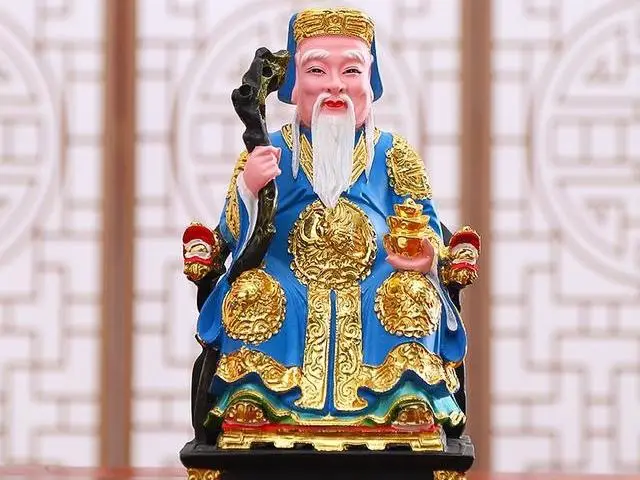
who is tu di gong?
The term “Tudi Gong” is actually a colloquial name for the official position of “God of Wealth and Prosperity.” Like Guan Yu, Tudi Gong was originally a mortal before becoming a deity. However, while Guan Yu was appointed a deity by the emperor, Tudi Gong’s elevation to the divine realm came from the worship of ordinary people.
Before becoming a deity, Tudi Gong was known as Zhang Fude and served as a tax official in the imperial court. Despite working with money, Zhang was known for his honesty and compassion towards the people. He did many good deeds that benefited both the country and its citizens. Because of his virtuous deeds, Zhang Fude lived to be 102 years old without any illnesses.
Legend has it that three days after Zhang Fude’s death, his face remained lifelike and unchanged. When this news spread, people were amazed. A poor farmer heard about Zhang Fude’s miracle and built a small altar with four stones to worship him. To his surprise, the farmer’s family gradually became prosperous.
Word of this miracle spread, and other poor people began to worship Zhang Fude as well. Some merchants even contributed money to build a temple to honor him. Over time, the number of Tudi Gong temples increased, and his popularity grew.
what is the tu di gong called in Chinese?
Tu Di Gong is the name for a Chinese deity who is often referred to as the “God of the Earth” or the “God of the Soil”. In Chinese folk religion, the god of the earth is known by various names such as Hou Tu, Tu Zheng, Earth Lord, Fu De Zheng Shen, dizhu shen , Land God ,Tu Di Ye, Tu Di Gong Gong, Tu Di Ye, She Shen, and Tu Bo. The official title of this deity is “Fu De Zheng Shen”.
Although the title of “Land God” has many names, its origin can be traced back to the gods of “She” and “Ji” in the ancient Chinese society. In ancient times, the god of the land and the place where the god of the land was worshipped were both called “She”. According to folk customs, during the planting or harvest season, farmers would set up a She altar to worship and pray to theTudi Gong for blessings or to give thanks.
tu di gong birthday
Tudi Gong, also known as the God of Wealth, the God of Earth, and the God of Community, is one of the folk beliefs of the Han ethnic group in China. The 5th day after the beginning of spring in the lunar calendar, also known as the 2nd day of the 2nd lunar month, is Tudi Gong’s birthday. Tudi Gong is widely worshipped in southern China, such as in Zhejiang, Fujian, Guangdong, and Guangxi.
Tudi Gong is the God of Wealth worshipped by merchants, and they often offer sacrifices to Tudi Gong on the 2nd and 16th days of each lunar month, known as “zuoyu” or “zuoya” in Chinese. Tudi Gong is one of the most common deities in folk beliefs and is popular in Han ethnic areas. Some ethnic minorities influenced by Han culture also believe in Tudi Gong.
tu di gong wife
Tudi Po Po, also known as Tudi Niang Niang, is the wife of Tudi Gong, the God of Earth. Although Tudi Gong often appears alone, he actually has a spouse, who is Tudi Po. The reason why Tudi Po appears less frequently may be because of her straightforward nature.
1.Legend has it that before appointing Tudi Gong (the God of Earth) to the mortal world, the Jade Emperor asked him what his wish was. The Jade Emperor promised to fulfill any wish he had. Tudi Gong said that he wanted to distribute all the wealth in the world equally among the mortals, so that they could be prosperous without any rich-poor gap. Tudi Po (the wife of Tudi Gong) heard this and quickly objected, “This won’t do. There should be a distinction between rich and poor in the world. If everyone is wealthy, who will carry my daughter’s wedding sedan?” Tudi Gong was swayed by her words and gave up on his wish.
2.Legend has it that when Tudi Gong arrived in the mortal world, he saw people mourning their deceased relatives and was moved with compassion. He pleaded with the Jade Emperor to exempt mortals from death and grant them long life. Tudi Po stepped forward to object, “If mortals never die, how will the Earth accommodate them all? What will they eat? Will they resort to cannibalism? If mortals don’t have enough to eat, who will bring us pork heads, fat chickens, and ducks to pay their respects?”
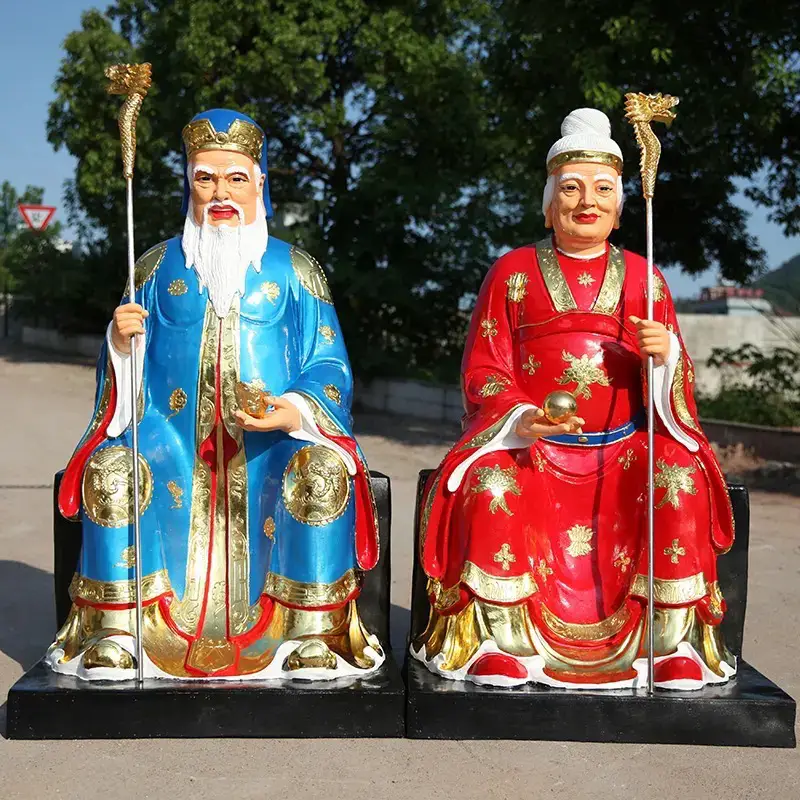
tu di gong story
Legend of theTudi Gong and the Fisherman’s Wife
According to legend, there was a couple ofTudi Gongs in Taiwan who had an urgent matter to attend to on Nan’ao Island. As they were walking along the seaside, they saw a fisherman’s wife crying uncontrollably under a big tree. They asked her what was wrong and she told them that she was from Nan’ao Island across the strait, and had been caught in a typhoon while out at sea. She had lost everything and was all alone with no hope, so she planned to hang herself from the tree.
TheTudi Gong wanted to give her some money to help her get through her difficulties, but his wife objected, saying that there were millions of fishermen who had died in typhoons, and they couldn’t possibly help them all. She urged him to focus on their own urgent matter and not get distracted.
TheTudi Gong became angry and said that they were sent down by the Jade Emperor to relieve the suffering of the people, and he pulled out some silver from his pocket and gave it to the fisherman’s wife. He then left his wife behind and went alone to Nan’ao Island.
When the rescued fisherman’s wife returned to Nan’ao Island and told the villagers what had happened, they were all angry at theTudi Gong’s wife for her heartlessness. From then on, they only worshipped theTudi Gong, as he was the one who had helped them. TheTudi Gong never returned to Taiwan and the people there only worshipped his wife, theTudi Gongdess.
Tudi Gong and Meng Jiangnu
Meng Jiangnu traveled thousands of miles to find her husband, and arrived at the Great Wall, where she learned that her husband, Wan Xiliang, had died at the foot of the wall. She cried so much that the sound shook the Great Wall and exposed piles of white bones. Meng Jiangnu searched for her husband’s remains among the bones of the countless laborers who had died building the Great Wall.
As she dug through the bones, her fingers bled and her tears fell onto the bones, turning them red like plum blossoms. She eventually found a complete set of bones and believed they belonged to her husband. She wrapped the bones in a bundle and carried them with her as she continued her journey.
On the way, she met an old couple who helped her carry the heavy bundle on her back. However, the couple were actually theTudi Gong and his wife, and they argued about the fate of Wan Xiliang’s soul. TheTudi Gong’s wife eventually became angry and caused the land beneath her to drift away until it became the island of Taiwan.
From then on, theTudi Gong on the mainland was worshipped as a male deity, while theTudi Gong on Taiwan was worshipped as a female deity.
what is tu di gong power?
TheTudi Gong is a grassroots deity in Chinese mythology. Some experts and scholars believe that theTudi Gong is a local administrative god who protects the peace and tranquility of the village. Other experts and scholars believe that theTudi Gong is under the City God and manages the household registration of the deceased in the village, serving as an administrative god in the underworld.
Nourishing all things
As the carrier and nourisher of all things, theTudi Gong grows the five grains to feed the people. This is why Chinese people worship theTudi Gong. The Tai Ping Yu Lan cites the Li Ji Wai Zhuan, which states, “The country depends on its people, and the people depend on food. Therefore, when a country is founded, the first thing to do is to establish a shrine. As the land is vast and the valleys are numerous, it is impossible to offer sacrifices everywhere, so a shrine is established inside the city for worship.”
Managing the local area
Since the Eastern Jin Dynasty, with the gradual improvement of the bureaucratic system from the central to the grassroots level, theTudi Gong has evolved into the lowest-level small god who can only manage the local area in the Taoist hierarchy. The Sui Shen Ji Volume Five of the Eastern Jin Dynasty states that Jiang Ziwen from Guangling died while chasing thieves. After Sun Quan came to power in the Eastern Wu, Jiang Ziwen showed up in the Taoist tradition, saying, “I will be theTudi Gong of this land to bless the people below.” The blessing for the people below refers to the protection of local homes, the addition of offspring, the prosperity of livestock, and the fairness to people. The southern Chinese tu di gong temple often has couplets that say, “TheTudi Gong is fair in doing things, and theTudi Gongdess is earnest in speaking.”
Underworld administration
In many areas of Han Chinese customs, each person has a “Temple KingTudi Gong,” which is similar to each person’s place of origin. After a person dies, when the Taoist priest performs a ritual to transfer the spirit, they will go to the person’s tu di gong temple to offer worship. Alternatively, the relatives of the newly deceased person will go to theTudi Gong’s temple, provide the deceased’s name, date of birth, and other information, in order to seek theTudi Gong’s guidance for the deceased.
In Fujian and Taiwan, people believe that theTudi Gong can bless agricultural harvests, as well as smooth business for traders and safe travels for travelers. TheTudi Gong can even protect graves from evil spirits. TheTudi Gong is a highly functional deity.
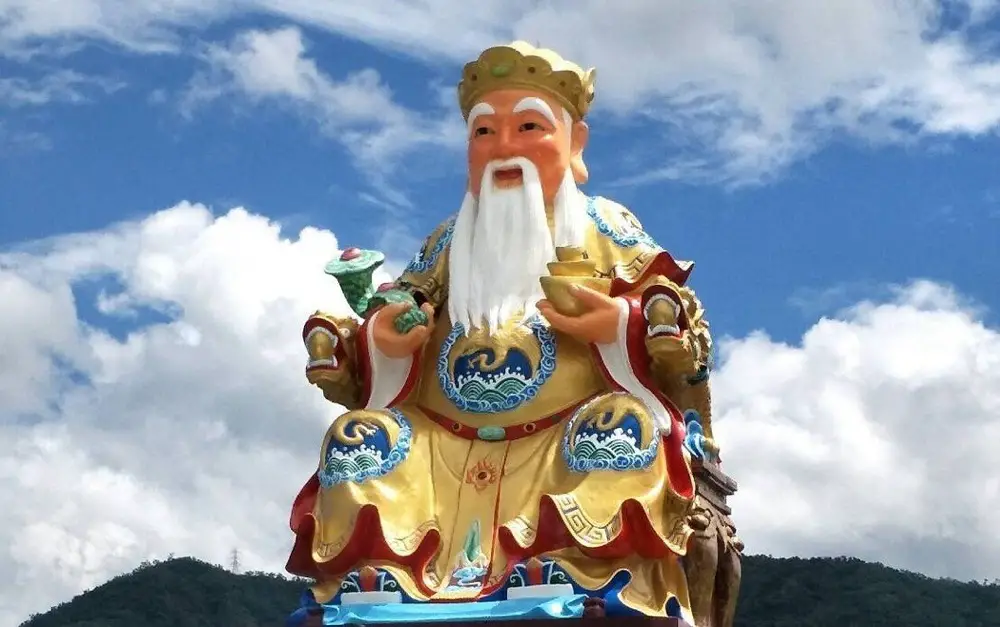
tu di gong in history
The history of the Earth God is long and involves a series of worship activities known as “She, Ji Tu” on the social day. The social day activities were most prosperous during the Han, Tang, and Song dynasties, but gradually declined afterwards. In many places, only the Earth God is worshiped without the social day. Therefore, we will not delve into it here. What we want to talk about is the historical prototype of the Earth God.
The Earth God, also known as the “God of Blessings and Virtue,” was historically based on an official named Zhang Fude in the Zhou Dynasty. He was born on the second day of the second month in the second year of King Wu of Zhou. He was known for his honest and diligent governance and love for the people. He passed away in the third year of King Mu of Zhou at the age of 102.
According to legend, a poor household used four large stones to build a stone house to worship him. Soon after, they became rich and the people believed that his divine blessings had protected them. They jointly built a temple and worshiped him with a gold body, taking his real name and honoring him as the “God of Blessings and Virtue.”
After the Ming and Qing dynasties, many famous people were worshipped as local Earth Gods. For example, Jiang Ziwen from the Three Kingdoms period and Han Yu, a great writer from the Tang Dynasty, were worshipped by the Hanlin Academy and the Ministry of Personnel in the Qing Dynasty. In Hangzhou and its surrounding areas, Yue Fei was worshipped as the Earth God. Different places have different customs, and many historical figures have been worshipped as local Earth Gods.
tu di gong in Chinese mythology
Tudi Gong, also known as “Land God” or “Earth God” in Chinese mythology, is a deity who is believed to preside over the land and protect its inhabitants. In traditional Chinese culture, the worship of the Land God is a form of ancestor worship and is deeply rooted in Chinese folk religion.
The Land God is typically depicted as an elderly man with a long beard, dressed in traditional Chinese clothing and wearing a hat. He is often portrayed holding a tablet or scroll, which symbolizes his authority over the land and its people.
In Chinese mythology, the Land God is often associated with the concept of feng shui, which is the practice of arranging buildings and objects in harmony with the natural environment. It is believed that by worshipping the Land God and following feng shui principles, one can attract good fortune and prosperity.
tu di gong in Funeral
Tu Di Gong is a deity who protects the land and the people living on it in Chinese folk religion and Taoism. He blesses the local community with safety, business success, and protection for travelers, as well as warding off evil spirits. In addition, Tu Di Gong is responsible for sending the souls of ordinary people to the underworld after death. People believe that by worshiping Tu Di Gong, he will take care of their deceased loved ones.
Since land is essential for human survival and prosperity, Tu Di Gong is highly regarded as a divine being in Chinese culture. He is also known as “Lao Tu Di,” “Hou Tu,” or “She Gong,” and is depicted as an elderly man with a white beard, holding a dragon staff in his right hand and a Yuanbao (a Chinese currency) in his left hand. He is responsible for both land administration and finance. People often use phrases such as “making money from Tu Di Gong” or “Tu Di Gong sending money” to describe their financial success.
Traditionally, people would pay respect to Tu Di Gong by burning incense, offering food, and burning paper money when burying their deceased loved ones, in hopes that he would help the souls to rest in peace. Tu Di Gong’s duties are crucial and multifaceted, including “land management, financial management, and moral governance.” Therefore, he is considered one of the “Five Worships” in Chinese culture.
Funeral Customs and Tudi Gong in Fujian
On the left side of the grave, a shrine for “Shi Di Gong” is set up, and people of status offer sacrifices to Shi Di Gong, known as “granting land”. After the coffin is buried, the family immediately offers incense, candles, and burns paper money to sacrifice to Shi Di Gong and bury the soul and belongings of the deceased. The family then kneels in front of the grave, with the eldest son kneeling and holding the deceased’s spirit tablet while the officiant uses a red brush to point to the sun and chants “rise to the highest level.” Then, the officiant adds a small dot to each side of the spirit tablet and chants “sharp hearing in both ears,” followed by “prosperity for the descendants, and academic success.” Finally, the officiant adds a dot to the character “Wang” on the spirit tablet.
When arriving at the grave, offerings are laid out, including seven bowls and a total of 11 bowls of food, such as pork, chicken, and noodles. After the family members have mourned, they burn a piece of joss paper as payment to Tudi Gong for his services, asking him to lead the deceased to the afterlife and arrange their life in the underworld.
tu di gong in feng shui
In feng shui, Tu Di Gong is considered to be a very auspicious and powerful deity. It is believed that by placing an image or statue of Tu Di Gong in your home or office, you can enhance your wealth, business, and overall good luck.
1. The best placement for Tu Di Gong:
- Let’s first take a look at the folk customs where Tu Di Gong is usually placed on the ground, connected to the earth, to signify guarding this piece of land. Offerings typically include fruits, nuts, etc., and three incense sticks are burned daily.
- Some shrines face the main entrance, which means they can scare away ghosts and monsters, guarding the home. For example, the statue of Guan Gong, who is a martial god of wealth, has the ability to protect and keep wealth. Facing the main entrance can dispel negative energy from outside and guard the home. However, the shrine of Tu Di Gong should not be placed directly across from the main entrance.
- The shrine should not face the door of the toilet or storage room. These areas contain impure energy, and placing the shrine across from them would allow this energy to enter the shrine, which is not auspicious.
- In many homes, the living space is on two levels. If a shrine is placed in the home, there should not be a toilet directly above it, as the toilet is an impure area, and impure energy can enter the shrine from above, obstructing one’s wealth.
- Like other shrines, Tu Di Gong’s placement should avoid noisy areas. For example, if your home is located next to a busy road with noise from cars and other sources, the shrine should be placed as far away from these noises as possible. It should not be placed near electronic devices such as televisions, refrigerators, and other appliances.
2. Taboos of Placing Tu Di Gong
- Tu Di Gong, like other deities, should not be placed in dirty or polluted areas.
- They should not be placed in toilets or kitchens, and a separate room should be designated for the worship of Tu Di Gong.
- This room should be kept clean and tidy. If the room is dirty and messy, the deity may become angry, and this may have a negative impact on one’s luck and fortune.
3. Offerings for Tu Di Gong
- Choose a Tu Di Gong statue that you like and find a practitioner to bless it or consult with a practitioner to ask which statue will be willing to accompany you.
- After obtaining the statue, use red paper to cover the eyes of Tu Di Gong, bring it home, and offer incense. Generally, place it near the door or on the ground in the kitchen, etc. If placed in a Buddhist shrine, it must be placed lower than the Buddha statue, and a separate altar should be purchased for it.
- Offer a cup of white wine every day, and replace it with a new cup every day.
- Offer fresh flowers and change the water every day. If the flowers are no longer fresh, replace them.
- Offer a bottle of white wine, various biscuits and snacks, and replace them on the first and fifteenth of every month. After offering, distribute the food to friends to improve interpersonal relationships.
- Offer incense daily and recite mantras.
- Remember to offer Tu Di Gong on the first and fifteenth day of each month: flowers, incense, candles, tea, three sacrifices, four fruits, milk, honey, and white wine.
tu di gong in Chinese new year
In Chinese folklore, Tu Di Gong is also regarded as a God of Wealth and God of Blessings, as the Chinese believe that “with earth comes wealth”. Therefore, Tu Di Gong is revered as a guardian deity by merchants. It is said that he can also bring a bountiful harvest, so many people invite him into their homes to worship him. In the main hall of a typical household’s five gods, Tu Di Gong must be included. If a family does not have Tu Di Gong, they can still set up incense, candlesticks, and offerings to worship him on the 2nd and 16th of each month in front of their house.
Fujian Province
On the 2nd day of the first lunar month, people in southern Fujian pray to Tu Di Gong for good luck, prosperity, and good health for the new year.
Guangdong Province
During the Chinese New Year in the western part of Maoming, there are many customs, the most famous of which is the New Year’s Eve celebration. But there is another obvious characteristic, that is, to pay respect to Tu Di Gong and ancestors.
On New Year’s Eve, each household begins to prepare chickens, geese, and other items to worship Tu Di Gong and ancestors, praying for blessings, health, and wealth for the next year.
After slaughtering the chickens and geese, they remove the feathers and boil them, arrange them into shapes, and place them on a plate. Then, they prepare black fungus, vermicelli, rice, and other items. In the afternoon, villagers begin to go to the nearby Tu Di Gong temple or altar to worship. Generally, each natural village or several natural villages will have a Tu Di Gong temple or altar. The altar is relatively simple, with only a few tables and some incense burners, and may not necessarily have a Tu Di Gong statue. But there is generally a tall and lush tree behind the altar, like a large umbrella, sheltering the altar from wind and rain. During the worship, after arranging the chickens, geese, and other items, three cups of tea and five cups of wine are placed in front of them. The tea should be poured full, and the wine should be passed three times. Then, three incense burners are placed on the left, middle, and right sides, and about 6 to 9 incense sticks are inserted, with more incense sticks in the middle burner. Paper money is burned, and firecrackers are set off. After the prayer is finished, they can tidy up the items and go home. Traditionally, they use a bamboo basket to carry the items. The number of participants is generally required to be as many family members as possible. However, fewer young people participate now. This ceremony may be a remnant of agricultural society, worshipping Tu Di Gong to pray for good weather. Now, it also includes content such as family happiness and wealth. Worshipping Tu Di Gong is only the first step. Next, they return to the ancestral home and begin to worship their ancestors in the main hall.
Other parts of China
Worshipping the Earth God is on the 1st and 15th of each month, with three incense sticks. It is advisable to worship in the morning and prepare fruits or biscuits. The fruits can be apples, pears, oranges, or mandarins. The types of fruits offered must be an odd number, but the number of items must be even. For example, when offering apples, the number of apples should be even, such as 2, 4, or 6. Finally, burn some gold ingots.
where to place tu di gong?–tu di Gong temple
tu di gong temple is a place of worship in China for the local deity known as “Tu Di Gong” or “Tu Di Po”, who are believed to be the guardians of the land. Tu Di Gong is considered the lowest-ranking deity in Chinese mythology, yet he is also the closest to the people and is considered a benevolent and protective god. He is responsible for keeping records of all the residents in the area, including their good and bad deeds, so that higher-ranking deities can keep an eye on them. As the saying goes, “the land supports the people, and the people depend on the land”.
Most tu di gong temples are small, community-built structures found throughout rural China, and they are among the most widely distributed places of worship in the country. Any place where Han Chinese people live is likely to have a place of worship for Tu Di Gong.
Although Tu Di Gong may be considered a minor deity, his role is essential as he serves as an important messenger between mortals and the divine realm. From transmitting written messages to burning gold paper offerings, the help of Tu Di Gong is indispensable.
The tu di gong temple, due to its low deity status and grassroots belief, often has a simple design. Most are built with cement or bricks, and in recent years, there are also luxurious ones built; there are also simple ones under trees or by the roadside, built with two stones as walls and one stone as a roof.
Although the tu di gong temple is not large, it embodies the people’s beautiful wishes for a peaceful and prosperous life and a bountiful harvest. The Land God originated from the ancient worship of land ownership by people. Rather than a belief, it is more of a culture that reflects the Han people’s reverence and gratitude for the land. As the land can produce crops, it is considered the “parents of clothing and food” for humans, so people sincerely worship the land. As a place where people gather to worship the Land God, the tu di gong temple naturally flourishes.
Famous tu di gong temple
- The tu di gong temple of Shangqiu is passed down by word of mouth and is located near the intersection of Pingyuan North Road and Yellow River West Road, towards the north of the Shangqiu Funeral Home. According to a septuagenarian who lived there, during the Anti-Japanese War, the brutal Japanese sweep made people suffer unbearably. The old man and his family hid in the tu di gong temple, and when the Japanese sweep reached the temple, the family thought they could not survive. However, when the Japanese pushed open the temple door, they did not see the family. The family knelt down one by one to thank the Land God for his divine intervention. This incident is widely circulated in Shangqiu, and the old man is still alive today.
- In Taiwan, the Land God has the ability of the God of Wealth, and business owners will worship the Land God on the 2nd and 16th day of the lunar month, known as “Zuoya.” The custom of worshipping the Land God is prevalent throughout Taiwan. On the other hand, graveyards in Taiwan commonly have a godly place for the Land God called the “Houtubi” or the statue of the Land God for worship. In addition, many areas have large Land God temples, such as Jingfu Temple in Taipei City and Hongluodi Land God Temple in Zhonghe City.
- In Hong Kong, there are mini shrines for the Land God in front of many small shops, and many families also have shrines outside their doors and offer incense daily. In rural areas, there is generally a small tu di gong temple to bless the whole village. Larger tu di gong temples located in the urban area of Hong Kong include Tai Hang Tung Fook Temple, Shau Kei Wan Fook Tak Temple, Tsim Sha Tsui Haiphong Road Fook Tak Kung Temple, Hung Hom Fook Tak Temple, and Ngau Tau Kok Pak Kung Temple.
- The Land God Temple in Beijing was built in the Yuan Dynasty and is located on the west side of the road at the south entrance of Xiashijie Street (formerly Huai Tree Street) outside Xuanwumen. The temple opens on the third day of each lunar month, and there are three temple fairs per month, namely the 3rd, 13th, and 23rd days. After the founding of the People’s Republic of China, it stopped operating. It is one of the five major temple fairs in Beijing and features Ming dynasty quyi performances during the temple fair.
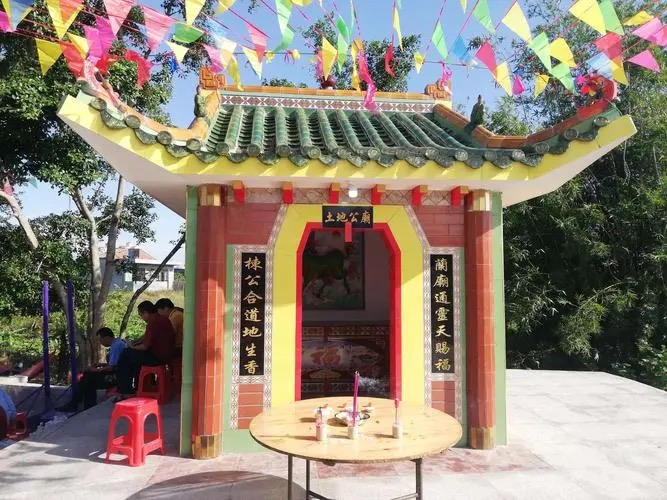
how to pray to tu di gong?
Depending on the region, the way of worshipping the Earth God and the offerings may vary, but they are generally similar. If the Earth God in your area has a particular favorite food, it is best to offer that. Otherwise, the following items are usually prepared:
Three Sacrifices
The Three Sacrifices usually consist of chicken, fish, and pork, but in some places, ducks, squid, and other items may be used. There is a belief that semi-cooked Three Sacrifices are used to worship the gods, while fully cooked ones are used to worship ancestors.
Fruit
Usually, an odd number of seasonal fruits are prepared, but some fruits, such as custard apples and guavas, are not typically used in offerings. It is important not to offer overripe or rotten fruit as it is disrespectful. Pineapple is a popular fruit for those in business, as it is believed to bring prosperity, while mandarin oranges are offered for good luck.
Sweet Treats
The Earth God is often depicted as an elderly man with bad teeth, so soft and sweet snacks are prepared for him to enjoy. Peanut candy, mochi, and pastries are common offerings.
Tea and Alcohol
Three cups of tea or alcohol are offered. Rice wine is usually used, but some may also offer Western liquor.
Longevity Noodles
Longevity noodles are a basic offering for worshipping the gods. It is important not to precook the noodles. If you have cooked them, you can wrap them in red paper or tie them up with red string.
Gold Paper
Tudi Gong Jin, or gold paper for Tudi Gong, is said to be exclusively used for worshipping Tudi Gong. The size of each sheet is small, with a small piece of gold foil on it and no other patterns. It can be considered the basic version of gold paper. If you are unsure of how Tudi Gong Jin looks like, you can go to a candle shop and tell the owner that you want to buy it for worshipping Tudi Gong. However, be careful not to buy silver paper as it is not meant for worshipping gods, and it would be a serious offense to use it wrongly.
Worshipping Time
Some people believe that it is most effective to worship Tudi Gong in the morning and try to finish before noon because Tudi Gong is an elderly deity who takes a nap during the afternoon. Thus, it is important not to disturb Tudi Gong while he is sleeping, and it is better to finish worshipping him as early as possible.
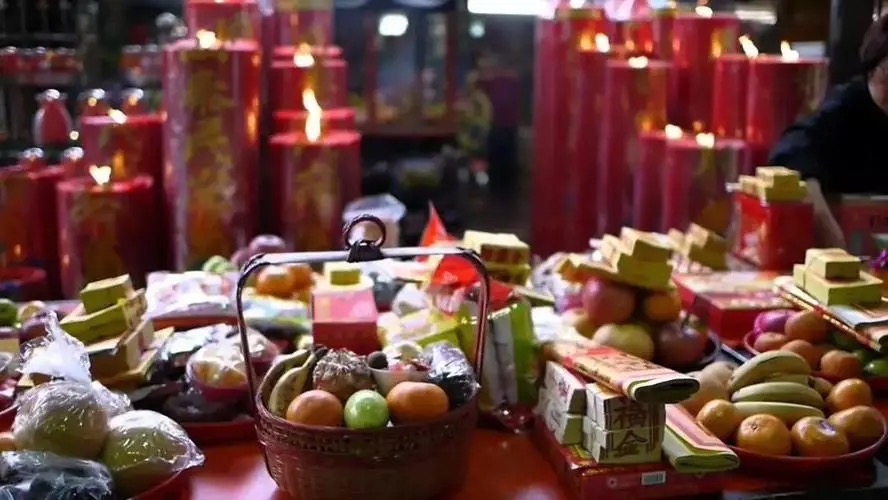
Tudi Temple Fair
The Tudi Temple Fair is an ancient traditional folk and folk-religious cultural activity. The Temple of the Earth God is located on the west side of the southern entrance of Xiashe Street, outside Xuanwu Gate in Beijing. It was originally called Huai Shu Xiashe Street, and was first built in the Yuan Dynasty. The temple originally had three floors and several annex buildings, with the main gate facing east. However, only the first floor of the temple remains, where the Earth God and Earth Goddess are worshipped. In the Qing Dynasty, the temple fair was held on the third day of every lunar month, while in the Republican era, it was changed to every ten days on the solar calendar.
The flowers of Fengtai have added luster to the Tudi Temple Fair and are welcomed by visitors. According to the “Tongzhi Duomen Zayong,” “Outside the temple, there are willow baskets and thorn baskets displayed, and few people can resist the charm of the famous flowers.” “Jintai Youxuecao” goes even further, saying that “nothing can compare to the temples of the east and west, and the beautiful flowers are the crowning glory of the north and south cities.” The temple fair at Dongjiao Longfu Temple and Xijiao Huguo Temple was said to have antique cultural relics, silk fabrics, and brocades, but the Tudi Temple Fair did not have these, but had an abundance of flowers and chicken feather dusters. According to “Yanjing Zaji,” “On the third day of every month, people gather at the Temple of the Earth God in the south city. Every household brings all kinds of necessary items, and the most numerous are chicken feather brooms, ranging from a little over a foot to over ten feet long, like a lush forest.” In the old days, every family had two chicken feather dusters, which were not only tools for cleaning dust, but also necessary decorations in the home, so a large quantity was needed, making them the most popular item at the temple fair.
In the 1920s and 1930s, the vendors at the Tudi Temple Fair were mainly located inside the temple courtyard, selling floral fabrics, daily necessities, needles and thread, wooden combs, shoe uppers and soles, and patterns. On the south to north side of the mountain gate were flower stalls, while on the opposite side of the street were sellers of pots, bowls, ladles, pots, baskets, and chicken feather dusters. The south entrance of Xiashe Street and the west side of Guang’anmen Street sold small agricultural tools, as well as various sizes of reed mats, reeds, thick and thin bamboo poles, hemp ropes, and curved needles for making cage bottoms. They also sold small circular reed mats, willow hoops, and rattan strips for making paper decorations, as well as hoes, shovels, carrying poles, and baskets for farmers and construction workers. The empty space to the west of the temple, now the site of Xuanwu Hospital, was a venue for cultural performances, including yangko dances, puppet shows, storytelling, drumming, and magic shows.
After 1949, the temple fair was still prosperous for a period of time. However, the construction of Xuanwu Hospital occupied the empty space to the west of the temple, while Xiashe Street and Guang’anmen Street became important transportation arteries, making it unsuitable for stalls. As a result, the temple fair was cancelled. The Temple of the Earth God still stands today, but it has become a large courtyard for residents.
Tu Di Gong vs. cheng huang ye
Tu Di Gong and Cheng Huang Ye are both deities in Chinese folk religion and are often worshiped in temples throughout China. However, they have different origins and functions.
Tu Di Gong, also known as the God of Earth, is believed to be the protector of the land and the people who live on it. He is often depicted as a middle-aged man with a long beard, holding a shovel and a sheaf of wheat. He is responsible for maintaining harmony between the natural world and human civilization, and is often invoked for protection, especially in matters related to agriculture, real estate, and family well-being.
Cheng Huang Ye, also known as the City God, is a deity who is believed to protect the city and its inhabitants. He is often depicted as a stern-looking man wearing official robes and holding a tablet with the name of the city inscribed on it. He is responsible for maintaining law and order within the city, and is often invoked for protection against crime, disputes, and other social ills.
While both Tu Di Gong and Cheng Huang Ye are important deities in Chinese folk religion, their roles and functions are distinct. Tu Di Gong is associated with the land and its resources, while Cheng Huang Ye is associated with the governance of the city and its inhabitants.
Tu Di Gong vs.God of Wealth
Tu Di Gong and the God of Wealth are both deities in Chinese mythology and religion, but they have different roles and responsibilities.
Tu Di Gong is the god of the earth and land, and is responsible for protecting and maintaining the fertility of the soil. He is also known as the protector of villages and cities, and is worshipped by farmers and merchants for good harvests and prosperity.
The God of Wealth, on the other hand, is a deity who is associated with good fortune and financial prosperity. He is often depicted holding a gold ingot and a sack of wealth, and is worshipped by businesspeople and individuals seeking financial success.
While both Tu Di Gong and the God of Wealth are worshipped for prosperity and good fortune, they have distinct roles and are worshipped for different reasons. Tu Di Gong is associated with the land and the natural environment, while the God of Wealth is associated with wealth and financial success.
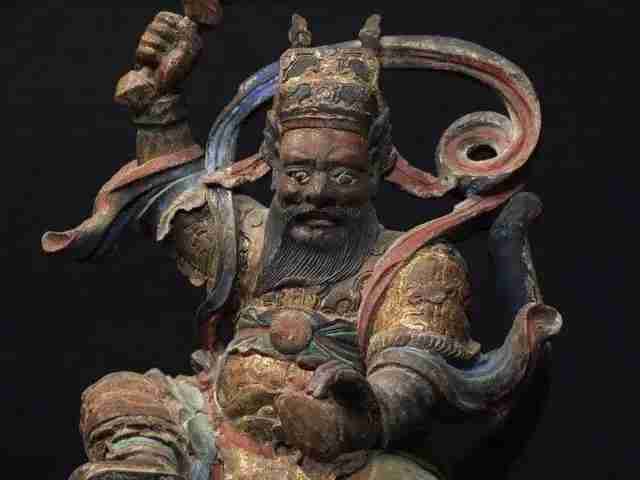
Tu Di Gong vs. kitchen god
Tu Di Gong and the Kitchen God are both deities in Chinese mythology but have different roles and functions.
Tu Di Gong, also known as the Earth God, is the deity responsible for overseeing the land and protecting the people who live on it. He is often worshipped in rural areas as the protector of crops and agriculture. Tu Di Gong is also believed to be the judge of the underworld, and many people pray to him for good fortune and protection.
The Kitchen God, on the other hand, is a deity who watches over the home and family. According to Chinese tradition, the Kitchen God is said to be the guardian of the hearth and stove, and it is believed that he reports on the family’s behavior to the Jade Emperor once a year. This report is said to determine the family’s fortune for the coming year.
In summary, while both Tu Di Gong and the Kitchen God are important deities in Chinese mythology, Tu Di Gong is associated with protecting the land and overseeing the underworld, while the Kitchen God is associated with watching over the home and family.
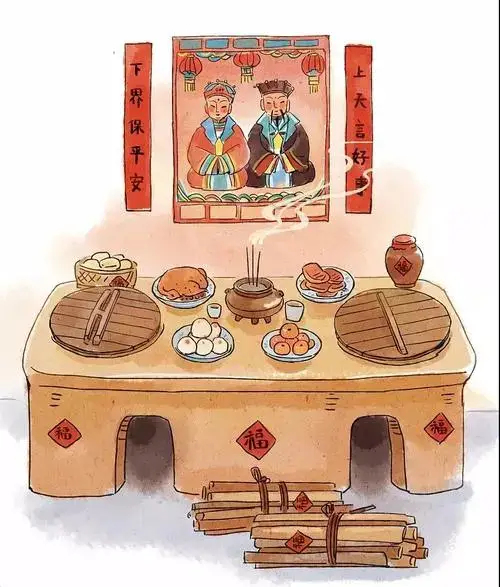
Tu Di Gong vs.Taisui
Tu Di Gong and Taisui are both deities in Chinese mythology, but they represent different things.
Tu Di Gong, also known as the Earth God or the God of Soil and Land, is a deity who is believed to protect and govern the land. He is often worshipped by farmers and those who work in agriculture, as well as people who live in rural areas.
On the other hand, Taisui, also known as the Grand Duke Jupiter, is a celestial deity that presides over the year and brings good fortune to those born in certain zodiac years. Taisui is believed to have a direct impact on a person’s destiny, and it is important to avoid offending or angering him.
In summary, Tu Di Gong is a deity associated with the land and agriculture, while Taisui is a celestial deity who influences a person’s destiny based on their zodiac sign.
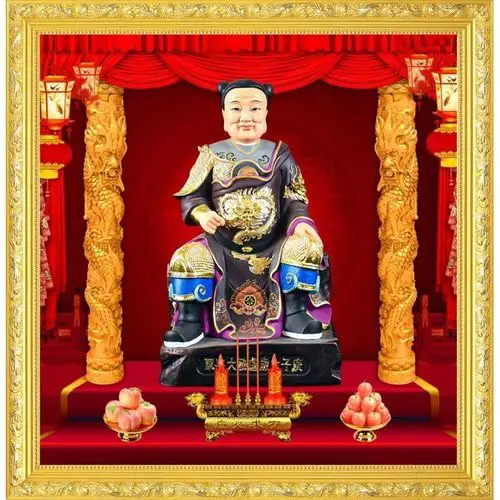
Tu Di Gong vs.Guandi Ye
Tu Di Gong and Guandi Ye are both deities in Chinese folk religion and mythology, but they have different roles and characteristics.
Tu Di Gong, also known as the Earth God or the God of the Soil and Land, is believed to be the protector of a specific region or area, usually a village or a town. He is responsible for ensuring the fertility and productivity of the land and for keeping the people safe from natural disasters and other calamities.
On the other hand, Guandi Ye, also known as Guan Yu or Lord Guan, is a legendary general and a symbol of loyalty and righteousness in Chinese history. He is worshipped as a god of war, wealth, and protection, and is often associated with martial arts and business success.
While both Tu Di Gong and Guandi Ye are considered powerful and benevolent deities in Chinese culture, they have different domains of influence and are worshipped for different reasons. Tu Di Gong is mainly worshipped for the well-being of the land and its people, while Guandi Ye is often worshipped for personal success and protection.
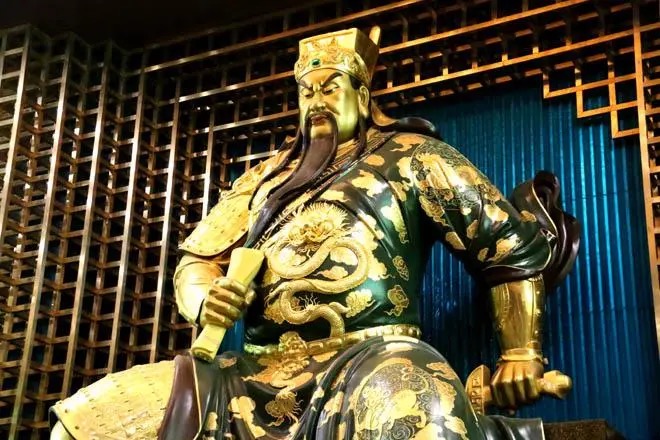
Tu Di Gong vs. Mountain god
In Chinese mythology and religion, Tu Di Gong is considered the god of the earth and soil, while the Mountain God (Shan Shen) is the god of the mountains. These are two different deities with different functions and domains.
Tu Di Gong is believed to be responsible for the land and its fertility, and is often worshiped by farmers and those who work the land. He is also associated with ancestor worship and is believed to oversee the welfare of the deceased ancestors. In contrast, the Mountain God is associated with the mountains, rocks, and other geological formations.
While both deities are considered important in Chinese mythology and religion, they serve different functions and are not typically compared or contrasted with one another.
dream of the tudi gong meaning
- Dreaming of the tudi gong taking you to his place indicates that you will change your workplace due to work changes, but your supervisor will eventually bring you back and give you a satisfactory response.
- Dreaming of the tudi gong turning into your appearance shows that you are filled with contradictions and complex thoughts, and you cannot distinguish which personality is the real you. Taking a mask that belongs only to you, can you be honest with your lover? Honesty will bring better development for both of you and be beneficial and harmless to your finances.
- Dreaming of the tudi gong friendly greeting you indicates that good fortune is coming, and your benefactor will also arrive. With the help of the benefactor, you will make a fortune, but don’t forget to repay the kindness, and doing so will bring better prospects for your future development.
- Dreaming of the tudi gong serving you tea and water predicts that your benefactor will appear, and you will also make achievements in your career. However, don’t forget to repay the kindness, when the benefactor is in crisis, step forward to help, and the result will benefit you greatly.
- Dreaming of the tudi gong getting angry with you implies that you should be careful when handling the relationship between friends and colleagues. Speak with a smile when talking with family members, and let go of any problems you encounter. Good luck will come to you.
In conclusion, Tudi Gong is an important deity in Chinese culture, and his worship reflects the deep connection between the land and the people who inhabit it. His importance is not limited to his association with agriculture but extends to his role as the protector of a specific locality or region. His worshippers believe that he brings good fortune, prosperity, and fertility to the area and protects them from natural disasters. His image can be found in many temples and shrines throughout China and in Chinese communities around the world, and his worship is an integral part of Chinese culture.